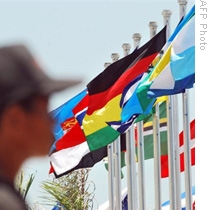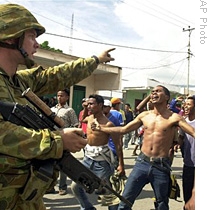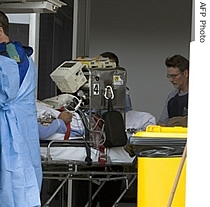Dili, East Timor
27 August 2009
 |
| A man stands next to flags in front of East Timor's president office as part of preparation for the 10th anniversary of independence in Dili, 26 Aug 2009 |
Police officer Bernadette Eligardo is a familiar face on the streets of Dili. "It is very, very peaceful and I hope sir that it will continue," he said.
Eligardo is from the Philippines and is with a United Nations police force of 1,500 that keeps the peace in East Timor.
Internal strife
Over the past decade, East Timor has faced threats both foreign and domestic.
After overwhelmingly voting for independence from Indonesia on August 30, 1999, the country was ransacked by Indonesian-backed militias. More than 1,000 people died before the Australian military intervened to restore order. The United Nations and international relief organizations came to help this new nation build a government and peaceful society.
 |
| An Australian soldier talks to angry East Timorese men in Dili, capital of East Timor, 28 Jun 2006 |
The prime minister at the time, Mari Alkatiri, blames political rivals for the violence and trying to replace the elected government.
"If you have two or three sovereign state institutions fighting each other, it means democracy failed," he said.
Alkatiri says he resigned as part of compromise to prevent a civil war. U.N. forces returned to the country and have been responsible for security since.
 |
| East Timor President Jose Ramos-Horta is seen on a stretcher as he is transfered from an ambulance to the Royal Darwin Hospital Emergency Department after arrival in Darwin, 11 Feb 2008 |
He says on the anniversary of independence, the country should choose reconciliation over confrontation.
"This year it is very important for us to in a consensus, we decide together, not to look for war and not to repeat the bad experience we had during these last 10 years," said Gusmao.
Despite the crises the country faced, Atul Khare, the U.N. special representative for East Timor, is optimistic about its future.
"It is not the absence of crisis. It is the manner in which the crisis is going to be met and resolved that defines a nation," said Khare. "And I think this nation is on the right track in promoting democratic consensus and promoting compromise."
Former Prime Minister Alkatiri is not so confident. He initially supported U.N. intervention but worries that East Timor is becoming too dependent on outside help.
"It is now become used to the people to feel secure because of the international presence here," said Alkatiri. "It is not good for the future of the country. We need now to have a clear program of reform, of defense and security that we can transmit to the people."
Major challenges
Poverty and unemployment remain major problems, as do the lack of good roads, good schools and health care. But security and stability have made it possible to begin addressing these problems.
In 2006 there more than 1,600 families lived in a refugee camp outside of Dili. Today there are less than 50.
The government has found housing for most but Balbina Desilva and her family were not so lucky.
She says yesterday they were moved into the city but the local people did not accept them. So they had to come back.
Changes
While independence has not yet brought prosperity, many in East Timor, like Elsa Expostu, who grows coffee in the rural highlands of the Aleiu district, say they are still better off today.
She says there is more opportunity today than there was under Indonesian rule.
The country's vast offshore oil and gas resources have provided the government $5 billion in revenue. That is a source of both hope and fear. The hope is that this money will fund development. The fear is that it will become a corrupting influence upon the country's leadership.
While East Timor faces many challenges, U.N. Special Representative Khare says it is on the path to becoming a vibrant democracy.
"I think it can be a beacon in the coming years for those of us who believe that the values of democracy, the values for respect for human rights, the values for respect for the rule of law are indeed universal values," he said.
Nation building, he says, is a long-term process and 10 years is just the beginning.